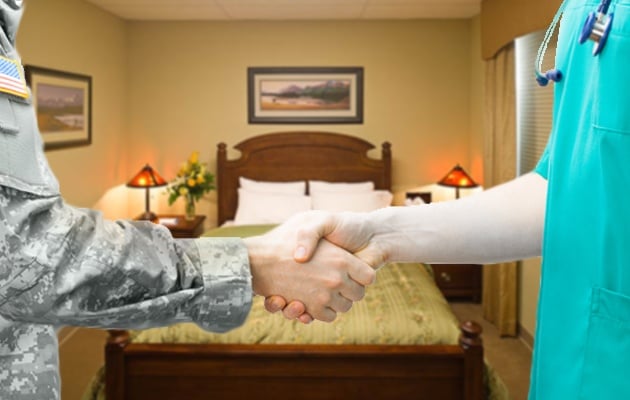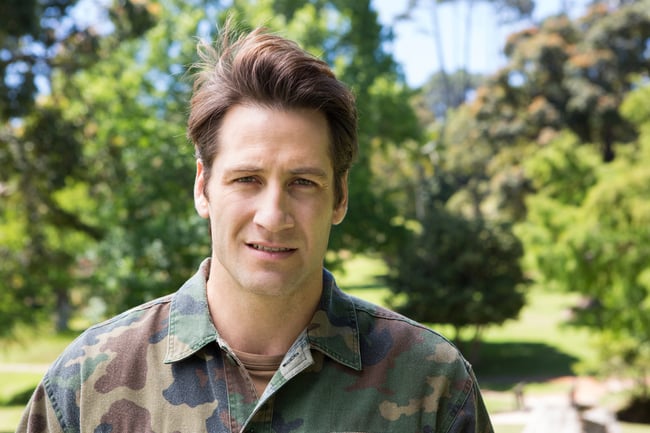September is Suicide Prevention Month. The most recent report published by the United States Department of Veterans Affairs, which analyzed 55 million veterans’ records from 1979 to 2016, the current analysis indicates that an average of 20 veterans a day die from suicide. Service members and Veterans who have defended our freedom have earned our enduring gratitude. They should have the opportunity to live meaningful, productive lives, in the same freedom and peace that their service and sacrifices made possible for so many other Americans.
Sleep problems among active-duty military and veterans are all too common. We’ve seen a growing body of research exploring the problems associated with soldiers’ sleep—and much of the news is not good. Both are at significantly greater risk for sleep disorders than the public.
Pentagon research has shown for years that poor sleep patterns negatively impact operational readiness and future health and well-being. The 2015 Department of Defense study found that 33% of service members reported feeling fatigued more than 3 times a week due to lack of sleep, while 51% reported some sort of sleep-related impact on their daily responsibilities.
Service members generally get less sleep than their civilian counterparts, with one study suggesting that 72% of previously deployed Army soldiers report typically getting less than six hours of sleep a night compared to 72% of civilian adults reporting getting seven or more hours per night. Adding to the concern related to the short sleep duration of military members is the impact of deployment, often repeated deployment and exposure to trauma and injury that has been well documented over the years of the wars in Iraq and Afghanistan. In fact, the most common complaint in post-deployment surveys of Service members returning from deployment is related to the quality or quantity of sleep.
Sleep problems coincide and contribute to other health problems, complicating a return from deployment and combat and elevating their risk for serious physical and mental health problems, including post-traumatic stress disorder (PTSD) and depression.
Insomnia is cited by military members as the most frequent sleep problem. During deployment, a military member may have to make substantial changes to ideal sleeping patterns that can increase the risk of insomnia upon returning home. Some of these changes to patterns include sleeping at random times or in small time periods, sleeping in a crowded, brightly lit area, sleeping on the ground or trying to sleep despite loud noises, including rocket and mortar fire. 54% of military personnel who have served since 9/11 experience insomnia. Insomnia rates among the general population are closer to 10%. Other factors that contribute to the frequency and severity of insomnia include the stress of deployment and exposure to combat, adjustment of re-entry to home and civilian life, and service-related injuries and illnesses, including mild traumatic brain injury.
Circadian rhythm disorders can stem from or be exacerbated by the hectic work schedules involved in military life. Military members often work long hours, have to report very early in the morning for duty, and get assigned to rotating work schedules. One example is the “Panama schedule” used by some units where every 2-3 days the worker switches from on to off duty and rotates the timing of the work shift from day to night every four weeks. Shift work is also more likely during deployments, and deployed service members on night shifts tend to have more difficulty falling and staying asleep, which may persist after returning home. Regarding sleep phase disorders, in the military environment where early rising is expected, patients with advanced sleep phase tendencies may perform well, but those with a preference for a much later bed and wake time tend to have problems adapting and often seek treatment believing they have insomnia when a delayed sleep phase disorder is present instead.
Nightmares, whether related to a full-blown mental health disorder such as PTSD or to exposure to trauma in general, comprise a number of sleep-related complaints among military members. Despite efforts among the military branches to reduce the stigma for seeking mental health-related help, service members and veterans may still be more willing to disclose and seek treatment for sleep difficulties, such as insomnia caused by nightmares, as opposed to first addressing any underlying trauma.
Today, if you work with service members or veterans you have probably come to expect to hear about sleep concerns. Insomnia symptoms are a strong predictor of suicide risk among military personnel, both active and retired. However, many psychologists have little or no training specific to the assessment and treatment of sleep disorders that would prepare them to work effectively with the military population.
Sleep-wake disorders and in particular insomnia, nightmares, and circadian rhythm disorders will continue to be a significant presenting concern of Service members and Veterans. A sleep clinic that is well versed in effective assessment and behavioral treatment techniques is a valuable asset to these clients. The ability to accurately assess a sleep problem and recognition of conditions that warrant referral to sleep specialists is key to the competent care of our military. Given the effectiveness of treatments for sleep-wake disorders, specifically the key role of behavioral interventions in the treatment of many of these conditions, and because we have the tools to contribute significantly to the care of our military population, it is important to arm them with the knowledge of the sleep clinician who makes Soldier and Veteran care a top priority.

In the past, Alaska Sleep Clinic (ASC) has been the primary place to send Service members and Veterans because it provides the highest quality care. However, changes in insurance and VA Choice administrators have resulted in them being sent to lesser quality sleep clinics. Alaska Sleep wants our military to know that they have a choice in where to get their sleep study done. The VA and Tri-care do pay for a sleep diagnostic sleep study; and no matter where the VA directs them, our military can choose instead to go to the only Veteran-Owned sleep lab in the state of Alaska. ASC owner Brent Fisher is a veteran and his father is a Veteran decorated 6 times for valor. Alaska Sleep Clinic is our state’s only sleep clinic accredited by the American Academy of Sleep Medicine (AASM), the gold standard in quality of care. As the only sleep clinic in Alaska with full time labs in Anchorage, Wasilla, Soldotna and Fairbanks, Alaska Sleep Clinic is ready to improve our military personnel’s quality of sleep and in turn, improving their quality of life.
More on our military and sleep disorders can be found at Psychology Today.
Active-duty or retired military and having trouble sleeping? Request a free 10-minute phone consultation now.









